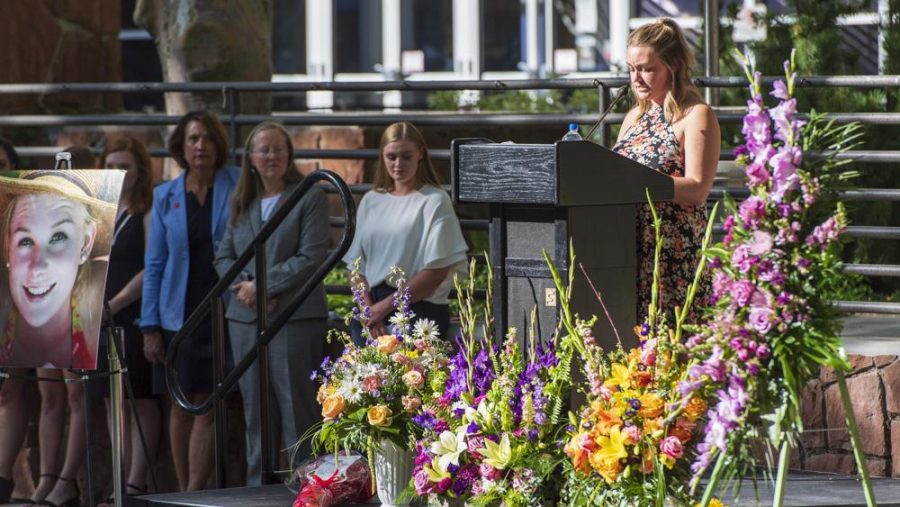Chavez: Stop Blaming and Start Advocating For Victims
Katie, a sorority sister of Mackenzie Lueck, speaks at her vigil. (Photo by Kiffer Creveling | The Daily Utah Chronicle)
August 25, 2019
Victim-blaming continues to come up in cultural conversations, but unfortunately, traditional media perpetuates this more often than it’s deconstructed by it.
A 2016 article from The Atlantic provides a comprehensive breakdown of why victim blaming is a pervasive phenomenon in our society, citing the “just world hypothesis” as one of the biggest reasons why it continues to occur. According to this hypothesis, people want to think that everyone gets what they deserve and that bad things do not generally happen to good people. To believe in this mindset, one must perform mental gymnastics.
Whether it is pickpocketing or sexual assault, victims are criticized for being unable to stop someone else from deciding to commit a crime against them. Instead of appropriately questioning and punishing the person who actually hurt someone, people contort their logic to figure out how the victim could have possibly prevented any bad thing which happened to them. To imply that a victim can always prevent crimes done against them is a participation in the culture of victim-blaming.
Victim blaming is not always as straightforward as making a comment directly about a victim or their actions. People often claim that they can be more careful, respectable or clever than victims of crime, making them feel bold enough to criticize their decisions. This is a behavior that I have been guilty of in the past. Because I deal with anxiety and catastrophic thinking, I’m always acutely concerned that a crime might happen to me at any given time. While this may be something I need to address in therapy, it remains a sort of my default mode that requires control of surroundings as much as possible to feel safe. Sometimes my reading about a tragic event in the news creates thoughts of, “If that was me, I would or wouldn’t have done that,” especially if the victim is a young woman like myself.
A study by researchers Laura Niemi and Liane Young, published in the Personality and Social Psychology Bulletin, supports the idea that the way we talk about crime and victims of crime affects victim-blaming. In their study, they changed the sentence structure of a statement about a criminal scenario and monitored the changes in participants’ perspectives of who was most responsible for the outcome. In one description, they used the criminal perpetrator as the subject of the sentence, in another, they used the victim as the subject. They concluded that “manipulating linguistic focus off of victims and onto perpetrators reduced victim blame.”
Many of us have been conditioned to think this way, but placing the moral responsibility of crime onto its victims remains a harmful perspective to have. Instead of speculating and judging the decisions that victims make, the public and the criminal justice system should focus more on the decisions made by perpetrators.
This is especially difficult when the depth of the general public’s interest in why people commit crimes is primarily geared towards entertainment value. True crime podcasts, TV shows like “Criminal Minds” or “Mindhunter” and countless serial killer biopics are proof of this. It is much easier for our media to sensationalize instead of look into the cultural forces and systemic flaws that turn people towards a life of crime. Victims are simply pieces in a story to us. As our attention fades, they or their families are left to deal with the aftermath of injustice all alone.
The podcast “Man in the Window” tells the story of the neighborhoods terrorized by the Golden State Killer, a California man who started out as a peeping Tom and cat burglar and would later rape more than 50 women and murder at least a dozen in the 1970s and 80s. Full of gruesome details, it’s a gripping case that took decades to solve — even a trial is still pending. The women who survived these attacks are still haunted by what happened to them. It’s horrible to hear how most of them were never offered any therapy or help to get through their pain. Their assaults were brushed under the rug, lower on the list of charges than kidnapping or robbery.
The reporter on this case, Paige St. John, also makes a note in an episode in the podcast that while there was another serial rapist active during the same time period in California, there was virtually no media attention given to that story at the time. St. John surmised it was because all of the victims were single women living alone, as opposed to the heterosexual couples which were targeted by the Golden State Killer.
Women are most often the target of victim-blaming. I admired St. John’s reporting because she wanted to give the women attacked by the “Man in the Window” an opportunity to tell their story, in their own way. She delved into the psychological profile of the rapist and killer, but she did not make it center stage. She gave the women a voice.
It’s hard to accept because it makes us feel vulnerable, but sometimes people simply choose to do bad things to other people, especially when cases hit close to home. The Daily Utah Chronicle reported on the vigil held after the murder of U student MacKenzie Lueck. By utilizing the approach of Niemi and Young, the difference in our perceptions are small, but they are powerful. We should avoid saying MacKenzie was killed as that subtly implies that her death was a result of her own actions. Someone killed MacKenzie. A person made the choice to kill her.
Whether it is property crime or violent crime, the language we use to describe it matters. The media has a responsibility to talk about victims’ stories in a respectful way. We must stop questioning the amount of time it takes for someone to come forward. There is a nuance to each person’s story and there is no playbook for how to react when you are the victim of a crime. There will always be room for fact-checking someone’s story, but our society needs to embrace more compassion and empathy for victims and focus our scrutiny on the decisions of perpetrators.
Lueck’s friends and sorority sisters have started a non-profit organization in her honor appropriately named MacKenzie’s Voice. One friend said, “Lueck’s voice was taken away during her disappearance and time of death.” The non-profit “will help other missing victims and families.” Just a few decades ago, women and victims of many crimes were completely silenced. Today, more stories are being told than ever.









Kristy K Bartley • Aug 26, 2019 at 4:02 pm
Thank you for writing this clear and powerful explanation of victim blaming. The clinical team at the Women’s Resource Center are all UCASA 40 hour trained rape crisis advocates. We help survivors heal and the culture of victim blaming makes that healing more difficult. As women in our culture we are taught to always blame ourselves for what happens to us. That is wrong and creates more trauma for victims. It also allows perpetrators to avoid accountability. We need to listen to survivors of violent crimes and believe their stories. As you say, there is always room for researching the facts, but not from a standpoint of victim blaming, but from the standpoint of making sure perpetrators are help accountable. Thank you again for your article.